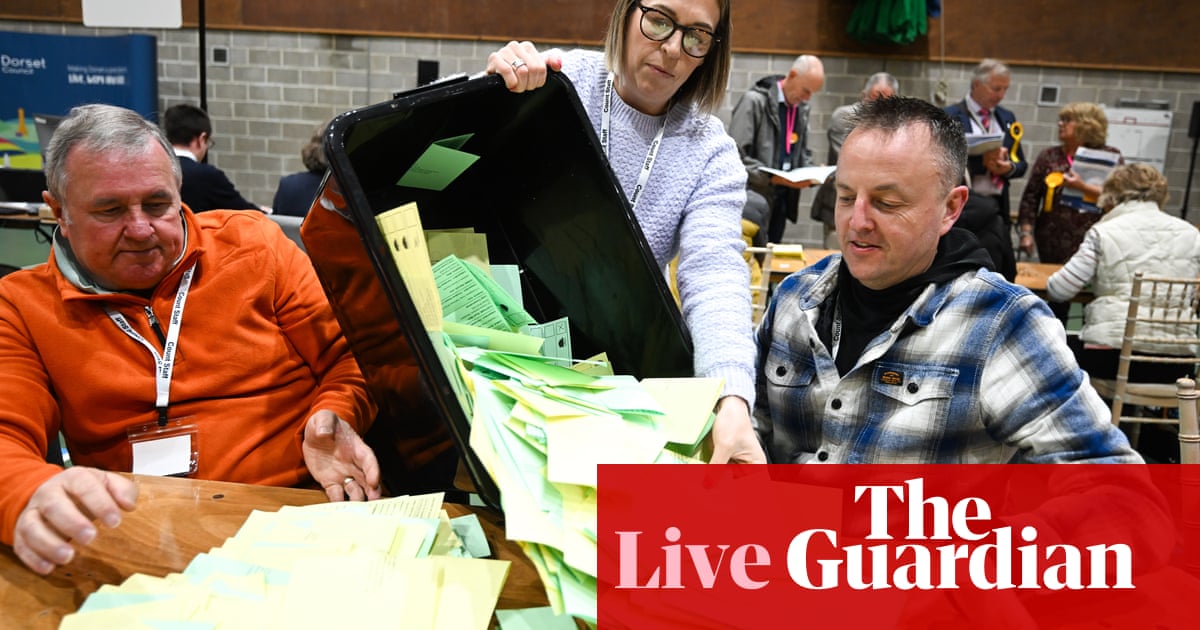Should Sadiq Khan be concerned?
Kiran Stacey
Starmer’s campaign chiefs say they can win more seats than their national vote share would suggest by targeting voters in the more marginal parts of the country, even if it means losing support in urban areas where the party has traditionally done well.
The downsides of that strategy became apparent as Friday wore on, with officials becoming more downbeat about taking the West Midlands and more nervous about Khan winning a third term in London.
Sources said much of the loss of urban support was being driven by anger among Muslim and progressive voters about Starmer’s stance on Gaza.
One London Labour source said: “The polls [that predicted a 20-point lead for Khan] were completely wrong, this is going to be much closer than expected.”
One in Birmingham said: “It felt very tough in Birmingham. [Akhmed Yakoob, an independent candidate] is picking up over 50% in some inner-city wards, so the Gaza impact may be bigger than first estimated.”
Key events
As mentioned earlier, the Liberal Democrats’ victory in Dorset yesterday was a significant result for the party.
Commenting last night on the result, Lib Dem leader Ed Davey said:
The Liberal Democrats are back in the West Country. This is a historic result.
After our stunning parliamentary byelection wins in Tiverton and Honiton, and Somerton and Frome, and our fantastic local election victories in the last two years in Somerset and Devon, and now Dorset, the Liberal Democrats are truly on the up in the West Country.”
Labour also won inaugural mayoral contests in the east Midlands and the north-east, and gained nine police and crime commissioner posts from the Tories, including in Cumbria, Avon and Somerset, and Norfolk.
It also took a Tory scalp by winning the Blackpool South byelection.
But in a smattering of councils, the opposition party lost seats to independents and George Galloway’s Workers Party of Britain, all apparently over the party’s stance on Gaza.
Overall, Labour won control of eight councils as it saw a net gain of 204 seats, while the Liberal Democrats gained 92 seats and the Greens 58.
The Liberal Democrats’ most significant victory was winning control of Dorset council from the Conservatives, where it now has 42 of the 82 seats after gaining 15.
The Greens fell narrowly short of taking overall control of Bristol, one of their top targets, despite gaining 10 seats.
Closing out the first day of results, Sunak suggested there was still hope for his party despite already suffering bruising defeats in the final test of voters before a general election.
He wrote in the Telegraph newspaper:
Thursday’s results showed that voters are frustrated and wondering why they should vote. The fact Labour is not winning in places that they admit themselves they need for a majority, shows that Keir Starmer’s lack of plan and vision is hurting them.
We Conservatives have everything to fight for – and we will because we are fighting for our values and our country’s future.”
Sunak pointed to his party’s recent commitment to increase defence spending, and measures to grasp migration as clear dividing lines with Labour.
Starmer meanwhile hailed his party’s victory in the York and North Yorkshire mayoral race on Friday afternoon as “truly historic”.
The region, which covers Sunak’s Richmond constituency, is somewhere Labour has historically struggled to compete in parliamentary elections.
Rishi Sunak braces for mayoral results as election counts continue
Rishi Sunak is braced for the result of key mayoral elections in London and the West Midlands, after the Conservatives were trounced in the first day of local election results.
As Friday’s result declarations closed, the Conservatives had suffered a net loss of 371 seats, and lost control of 10 councils.
Despite widespread losses, the prime minister appeared to take solace from the Tories’ win in the Tees Valley mayoral election.
Ben Houchen retained the mayoralty, amid denials he had sought to distance himself from the Conservative party during his campaign.
All eyes will now turn to mayoral contests in London and the West Midlands, the results of which will be declared on Saturday.
Labour incumbent Sadiq Khan is now believed to have a closer-than-expected contest with Tory challenger Susan Hall in the capital, while a narrow contest is also likely for West Midlands Tory mayor Andy Street.
The results of several other mayoral, council, and police and crime commissioner elections will also be announced as the weekend begins.
Saturday’s results could be further fodder to Tory rebels set on ousting Sunak before the general election, should the Conservatives suffer key losses.
The police and crime commissioners in England and Wales election results left to declare are:
-
Cheshire
-
Dorset
-
Hertfordshire
-
Kent
-
Merseyside
-
Sussex
-
Thames Valley
-
Warwickshire
-
West Midlands
-
Wiltshire
Election results yet to be declared
Although most of the local election results rolled in yesterday, there are still several results to come today. Of the 107 councils up for grabs, 102 have so far declared their results in these local elections.
We can expect results from four councils today:
-
Epping Forest
-
North Tyneside
-
Stroud
-
Warrington
According to PA, it’s likely that results will be declared about 4pm. We’ll have to wait until Sunday for the final council to declare: Salford.
We’re also expecting the results of seven of the 11 mayoral races:
The official London mayoral declaration time is TBC but the picture should become clear about 1.30pm.
Plus, there will be further results from the elections for police and crime commissioners in England and Wales as only 27 of 37 were announced yesterday.
Should Sadiq Khan be concerned?
Kiran Stacey
Starmer’s campaign chiefs say they can win more seats than their national vote share would suggest by targeting voters in the more marginal parts of the country, even if it means losing support in urban areas where the party has traditionally done well.
The downsides of that strategy became apparent as Friday wore on, with officials becoming more downbeat about taking the West Midlands and more nervous about Khan winning a third term in London.
Sources said much of the loss of urban support was being driven by anger among Muslim and progressive voters about Starmer’s stance on Gaza.
One London Labour source said: “The polls [that predicted a 20-point lead for Khan] were completely wrong, this is going to be much closer than expected.”
One in Birmingham said: “It felt very tough in Birmingham. [Akhmed Yakoob, an independent candidate] is picking up over 50% in some inner-city wards, so the Gaza impact may be bigger than first estimated.”

Steven Morris
The Greens were celebrating a spectacular win in Bristol yesterday, where it became by far the largest party, as it headed for a record number of councillors in local elections across England.
Party officials said they believed they were on track to finish with more than 800 members on more than 170 councils.
In Bristol they fell narrowly short of taking overall control, winning 34 of the 70 seats and leaving Labour trailing a distant second with 21. The Bristol Green group, which will lead the council, becomes the largest the party has had.
Carla Denyer, the co-leader of the party in England and Wales, said it was an “exciting result”, telling the Guardian:
It’s really encouraging to see so many voters are giving their confidence to the Greens. It’s also a very promising sign for the general election.
The party picked up all 14 seats in the heart of the city, a boost to its chances of winning the Westminster seat of Bristol Central.
Boris Johnson has thanked three villagers who turned him away from a polling station on Thursday for attempting to vote without a valid ID.
Writing for the Daily Mail, Johnson said he attempted to use a copy of Prospect magazine as a form of identification, but was turned away by local electorate officials.
Mr Johnson wrote:
I want to pay a particular tribute to the three villagers who on Thursday rightly turned me away when I appeared in the polling station with nothing to prove my identity except the sleeve of my copy of Prospect magazine, on which my name and address had been printed.
I showed it to them and they looked very dubious… within minutes I was back with my driving licence and voted Tory.
The requirement to provide photo ID was introduced by Mr Johnson during his time in Downing Street as part of the Elections Act 2022.
Kiran Stacey
Beneath the euphoria of Labour’s wins in places such as Blackpool, Hartlepool and Thurrock lies a nervousness about the party’s performance in urban areas, with campaigners warning it had lost ground in both London and Birmingham.
By Friday afternoon, the party had gained more than 140 council seats and won the Blackpool South byelection with the third biggest swing in post-war history. But party sources said they were not confident of winning the marginal West Midlands mayoral race and that the Tory candidate for the London mayoralty, Susan Hall, could also run Sadiq Khan unexpectedly close.
Rob Ford, a professor of politics at the University of Manchester, said:
The Labour strategy was to do better in parts of the country they had lost since 2016: leave areas, more rural areas, more Tory areas, whiter areas. They have done better across the board in all those areas.
They also have seen trouble brewing up on their left flank. There has been a substantial loss of support in heavily Muslim areas and they are going backwards a bit in progressive areas and areas with students. It is progress at a price.
Recap: what are these elections?
On 2 May, 107 English councils held elections with more than 2,000 seats being contested. Some were for metropolitan boroughs such as Manchester city council and others for unitary authorities such as Bristol or Dorset. Both structures are single-tier authorities with responsibility for the whole range of council services, including education, social care, rubbish collection and parks.
There were elections for 58 district councils, lower-tier authorities whose responsibilities are more limited, but include planning, housing and recycling. District councils typically elect a third of their seats each year on a four-yearly cycle, and elect the upper tier council — usually the county council — in the fourth year.
There were elections in London for the London assembly as well as 11 mayors including those of London, greater Manchester and Liverpool. These were subject to changes in their voting system since the last time they were up for election. They are now elected on a first past the post basis. Police and crime commissioners were also up for election.
‘No such thing as a safe Tory seat any more’

Rowena Mason
The spread of the Conservative losses led one former minister to claim there was “no such thing really as a safe Tory seat any more”, but the prime minister appeared committed to clinging on until polling day, with rebels in his own party lacking the support to oust him.
The polling expert Prof John Curtice of Strathclyde University said the results added up to “one of the worst, if not the worst” performances by the Conservatives in four decades.
The party is expected to lose up to 500 seats when all votes are counted, with Labour advancing in areas of both the “red wall” north won by the Tories under Boris Johnson and the traditional southern Conservative heartlands.
Keir Starmer hailed “seismic” results, including winning a landslide byelection in Blackpool South, with the third largest swing since the second world war, as well as mayoralties in the East Midlands, North East and North Yorkshire, which covers Sunak’s own constituency.
Labour also ousted a number of Tory police and crime commissioners, and took control of at least seven new councils, including in Buckinghamshire, Essex, Hampshire and Sussex in the south of England.
Good morning
We’re restarting our live coverage of the local and mayoral elections results in England.
The results of mayoral elections in Greater Manchester, London and the West Midlands are among those expected today.
My colleague Rowena Mason has this report on yesterday’s results, which showed the Tories facing one of their worst local election results in 40 years, with striking Labour gains across England and Wales in key battlegrounds they need to secure victory at the general election.
You can also see a full list of the results across England
We’ll bring you the latest updates throughout the day.







